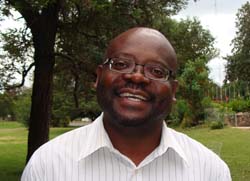N2Africa Podcaster 5
March 2011
|
| Title |
Summary |
Newsletter item # |
| Rhizobiology Manual Almost Ready |
|
A writeshop was held in March as part of the collaboration between SIMLESA (Sustainable Intensification of Maize-Legume Cropping Systems For Food Security In Eastern And Southern Africa), the ACIAR funded project and N2Africa. An international team of nitrogen fixation experts met to write a state-of-the-art manual on Rottnest Island, off Fremantle, West Australia. Participants were John Howieson, Mariangela Hungria, Ken Giller (N2Africa Steering Committee), David Herridge, Ros Deaker (University of Sydney), Graham O’Hara, Ron Yates, Wayne Reeve, Vanessa Melino (Murdoch University) and Phil Poole (John Innes Institute). Abdullahi Bala was unable to get a visa to attend but contributed two outline chapters for the manual. At the end of the week more than 95% of thirteen chapters was ready for review and polishing. It is hoped that the manual will be printed within a few months so that it can become the standard laboratory text for N2Africa. |
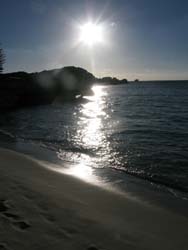 |
|
1 |
| Annual N2Africa Planning Meeting in Harare |
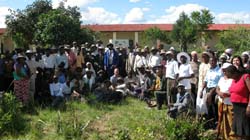 |
The workshop focussed on exchanging information on progress in the different countries and on planning for the scaling up of the activities in the second year. A field visit to Goromonzi showed the strong interaction between participant and farmers. |
|
1 |
| Results from the N2Africa baseline survey in East and Central Africa |
The N2Africa baseline survey targeting 1200 households in Kenya, Rwanda and DR Congo has been completed and analysed. A comprehensive report on the results will soon be published on the N2Africa website. Here are already some results.
|
2 |
| Soyabean inoculation responses from the 2010 season in West Africa |
We are currently collating results from the first year’s research and demonstration trials across the eight countries. Here is a preview of results from Ghana and Nigeria where strong responses to inoculation with soyabean were found in farmers’ fields. In Ghana where the rainy season ended very late many of the soyabean crops yielded more than 3 t/ha, whereas in Nigeria the top yields were around 2 t/ha. Strong responses to inoculation were observed in many cases. Click title for graphs.
|
2 |
| Ensuring of understanding the status of value chains of our four major crops |
|
One of the important objectives of N2Africa is to work with partners in all of our eight countries to ensure that we understand the status of value chains of our four major crops soybean, cowpea, groundnut and common bean. This knowledge will be used to help plan, for example where market linkages need to be improved or where agro dealers need to be encouraged to stock specific inputs and receive training on their storage and use. The person leading this study is Joseph Rusike, on the photo. Joseph will be visiting all eight countries. |
|
|
3 |
| Zimbabwe farmers growing soybean |
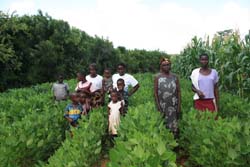 |
During February Professor Paramu Mafongoya lead a group of N2Africa team members to several different project sites in Zimbabwe to meet farm families that are participating in our project. Many families were growing soybean for the first time even though they had seen it produced by other farmers. Most were very impressed with the excellent growth and lack of disease and insect problems. The main concern of farmers in Zimbabwe is to have an accessible market for their soya produce. In addition, farmers want to know how to use soybean for consumption in their households. |
|
4 |
| TL-II and improved bean varieties |
|
One of the most important components of the production packages being disseminated to farmers by N2Africa are improved varieties of soybean, common bean, groundnut and cowpea. Many of these improved varieties have been developed and tested by the Tropical Legumes II (TL-II) project. For example there are numerous soybean varieties that are being introduced to farmers that were developed by TL- II. In March the N2Africa project leader, Kenton Dashiell was in Malawi and met with Hailu Tefera (pictured) the scientist leading the TL-II soybean breeding project. Hailu indicated that in the next few years we should expect to have new soybean varieties that have improved resistance to soybean rust and higher grain and fodder yields. |
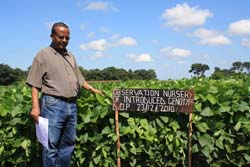 |
|
5 |
| CIALCA and CGIAR Consortium Research Programme on the Humid Tropics announce a Conference on the 'Challenges and Opportunities for Agricultural Intensification of the Humid Highland Systems', Kigali Rwanda 24-27 October 2011 |
CIALCA and the CGIAR Consortium Research Programme (CRP) on the Humid Tropics have the pleasure of announcing an international conference on the 'Challenges and Opportunities for Agricultural Intensification of the Humid Highland Systems of sub-Saharan Africa', to be convened in Kigali, Rwanda from 24-27 October 2011.
Please see the conference flyer (English) for more details, including registration information and how to submit a paper or poster for presentation.
|
6 |
|
|
The Podcaster is published six times per year – we look forward to receiving news and contributions – particularly from partners. Please send in contributions well in time. Contact address for this newsletter is: N2Africa.office@wur.nl
Please feel free to forward this email to colleagues you believe would be interested. This email has been sent to you by N2Africa, funded by The Bill & Melinda Gates Foundation.
When you change your e-mail address and want to keep receiving the Podcaster, please send your new address to N2Africa.office@wur.nl. If friends/colleagues like to receive future Podcasters let N2Africa.office@wur.nl know as well.




